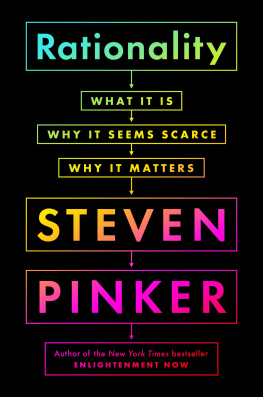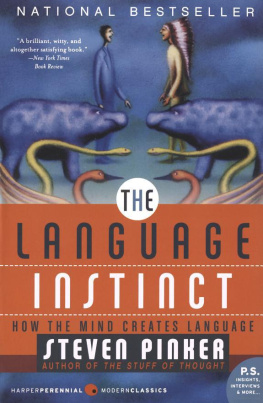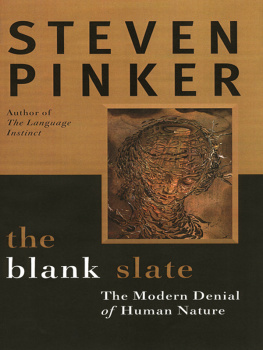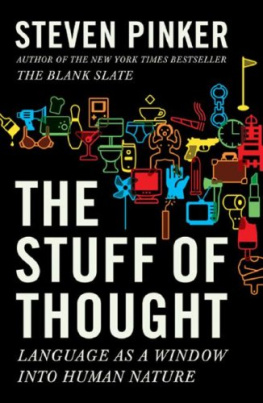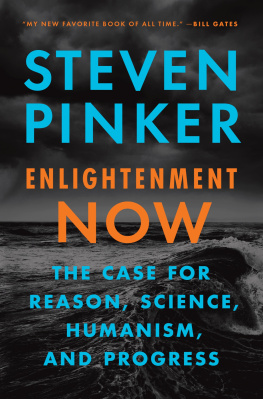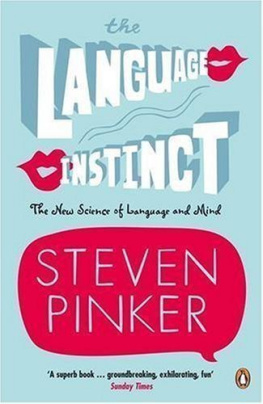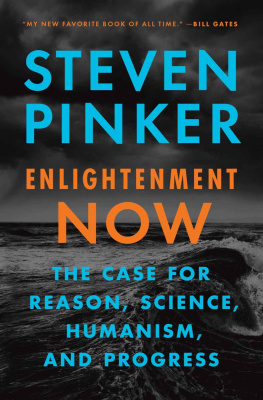Steven Pinker - Rationality: What It Is, Why It Seems Scarce, Why It Matters
Here you can read online Steven Pinker - Rationality: What It Is, Why It Seems Scarce, Why It Matters full text of the book (entire story) in english for free. Download pdf and epub, get meaning, cover and reviews about this ebook. year: 2021, publisher: Penguin Publishing Group, genre: Romance novel. Description of the work, (preface) as well as reviews are available. Best literature library LitArk.com created for fans of good reading and offers a wide selection of genres:
Romance novel
Science fiction
Adventure
Detective
Science
History
Home and family
Prose
Art
Politics
Computer
Non-fiction
Religion
Business
Children
Humor
Choose a favorite category and find really read worthwhile books. Enjoy immersion in the world of imagination, feel the emotions of the characters or learn something new for yourself, make an fascinating discovery.
- Book:Rationality: What It Is, Why It Seems Scarce, Why It Matters
- Author:
- Publisher:Penguin Publishing Group
- Genre:
- Year:2021
- Rating:3 / 5
- Favourites:Add to favourites
- Your mark:
- 60
- 1
- 2
- 3
- 4
- 5
Rationality: What It Is, Why It Seems Scarce, Why It Matters: summary, description and annotation
We offer to read an annotation, description, summary or preface (depends on what the author of the book "Rationality: What It Is, Why It Seems Scarce, Why It Matters" wrote himself). If you haven't found the necessary information about the book — write in the comments, we will try to find it.
Rationality: What It Is, Why It Seems Scarce, Why It Matters — read online for free the complete book (whole text) full work
Below is the text of the book, divided by pages. System saving the place of the last page read, allows you to conveniently read the book "Rationality: What It Is, Why It Seems Scarce, Why It Matters" online for free, without having to search again every time where you left off. Put a bookmark, and you can go to the page where you finished reading at any time.
Font size:
Interval:
Bookmark:
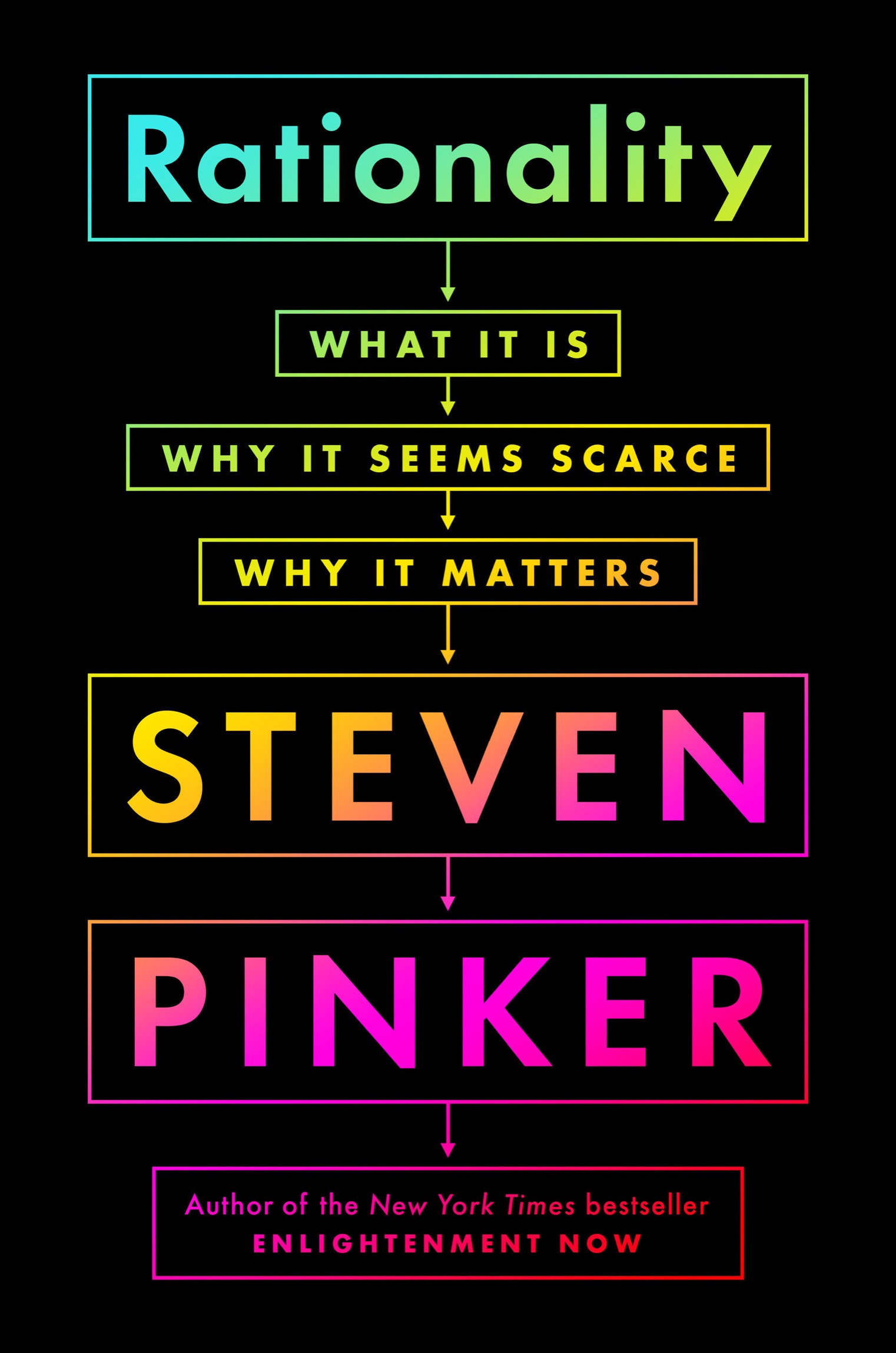
Language Learnability and Language Development
Learnability and Cognition
The Language Instinct
How the Mind Works
Words and Rules
The Blank Slate
The Stuff of Thought
The Better Angels of Our Nature
Language, Cognition, and Human Nature: Selected Articles
The Sense of Style
Enlightenment Now
EDITED BY STEVEN PINKER
Visual Cognition
Connections and Symbols (with Jacques Mehler)
Lexical and Conceptual Semantics (with Beth Levin)
The Best American Science and Nature Writing 2004
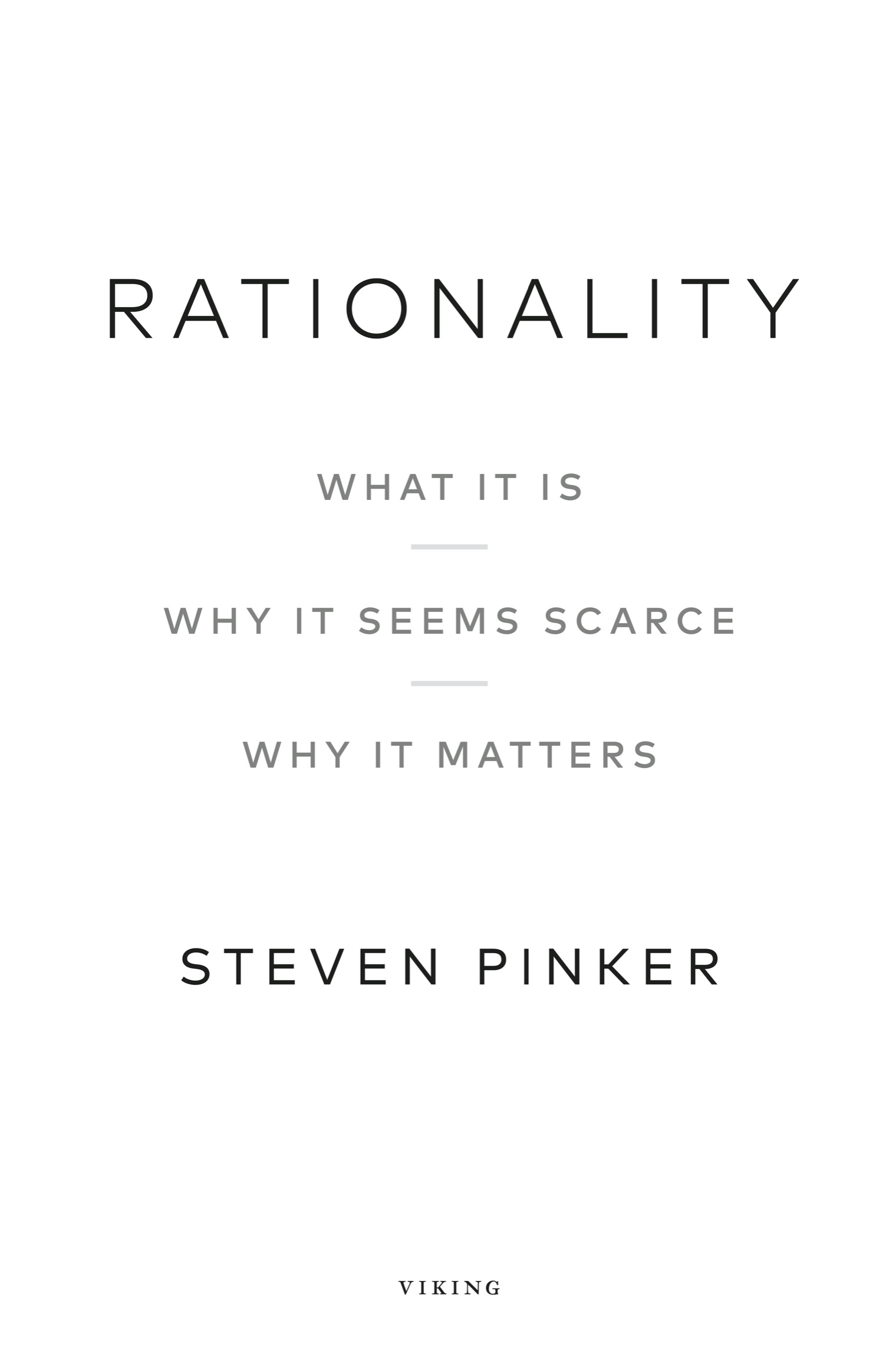
VIKING
An imprint of Penguin Random House LLC
penguinrandomhouse.com
Copyright 2021 by Steven Pinker
Penguin supports copyright. Copyright fuels creativity, encourages diverse voices, promotes free speech, and creates a vibrant culture. Thank you for buying an authorized edition of this book and for complying with copyright laws by not reproducing, scanning, or distributing any part of it in any form without permission. You are supporting writers and allowing Penguin to continue to publish books for every reader.
Grateful acknowledgment is made for permission to reprint the following:
Excerpt on from The Odyssey by Homer, translated by Emily Wilson. Copyright 2018 by Emily Wilson. Used by permission of W. W. Norton & Company, Inc.
Charts rendered by Ilavenil Subbiah
library of congress cataloging-in-publication data
Names: Pinker, Steven, 1954 author.
Title: Rationality : what it is, why it seems scarce, why it matters / Steven Pinker.
Description: 1st Edition. | New York : Viking, 2021. | Includes bibliographical references and index.
Identifiers: LCCN 2021003592 (print) | LCCN 2021003593 (ebook) | ISBN 9780525561996 (hardcover) | ISBN 9780525562009 (ebook) | ISBN 9780593489352 (international edition)
Subjects: LCSH: Critical thinking. | Practical reason. | Choice (Psychology)
Classification: LCC BF441 .P56 2021 (print) | LCC BF441 (ebook) | DDC 153.4/2dc23
LC record available at https://lccn.loc.gov/2021003592
LC ebook record available at https://lccn.loc.gov/2021003593
Cover design: Pete Garceau
Designed by Meighan Cavanaugh, adapted for ebook by Cora Wigen
pid_prh_5.8.0_c0_r0
To Roslyn Wiesenfeld Pinker
What is a man,
If his chief good and market of his time
Be but to sleep and feed? A beast, no more.
Sure he that made us with such large discourse,
Looking before and after, gave us not
That capability and godlike reason
To fust in us unusd.
Hamlet
Rationality ought to be the lodestar for everything we think and do. (If you disagree, are your objections rational?) Yet in an era blessed with unprecedented resources for reasoning, the public sphere is infested with fake news, quack cures, conspiracy theories, and post-truth rhetoric.
How can we make sense of making senseand its opposite? The question is urgent. In the third decade of the third millennium, we face deadly threats to our health, our democracy, and the livability of our planet. Though the problems are daunting, solutions exist, and our species has the intellectual wherewithal to find them. Yet among our fiercest problems today is convincing people to accept the solutions when we do find them.
Commentaries by the thousands have lamented our shortfall of reason, and its become conventional wisdom that people are simply irrational. In social science and the media, the human being is portrayed as a caveman out of time, poised to react to a lion in the grass with a suite of biases, blind spots, fallacies, and illusions. (The Wikipedia entry for cognitive biases lists almost two hundred.)
Yet as a cognitive scientist I cannot accept the cynical view that the human brain is a basket of delusions. Hunter-gatherersour ancestors and contemporariesare not nervous rabbits but cerebral problem solvers. A list of the ways in which were stupid cant explain why were so smart: smart enough to have discovered the laws of nature, transformed the planet, lengthened and enriched our lives, and, not least, articulated the rules of rationality that we so often flout.
To be sure, I am among the first to insist that we can understand human nature only by considering the mismatch between the environment in which we evolved and the environment we find ourselves in today. But the world to which our minds are adapted is not just the Pleistocene savannah. Its any nonacademic, nontechnocratic milieuwhich is to say, most of human experiencein which the modern instruments of rationality like statistical formulas and datasets are unavailable or inapplicable. As we shall see, when people are given problems that are closer to their lived reality and framed in the ways in which they naturally encounter the world, they are not as witless as they appear. Not that this gets us off the hook. Today we do have refined instruments of reason, and we are best off, as individuals and as a society, when we understand and apply them.
This book grew out of a course I taught at Harvard which explored the nature of rationality and the puzzle of why it seems to be so scarce. Like many psychologists, I love to teach the arresting, Nobel Prizewinning discoveries of the infirmities that afflict human reason, and consider them to be among the deepest gifts to knowledge that our science has contributed. And like many, I believe that the benchmarks of rationality that people so often fail to measure up to should be a goal of education and popular science. Just as citizens should grasp the basics of history, science, and the written word, they should command the intellectual tools of sound reasoning. These include logic, critical thinking, probability, correlation and causation, the optimal ways to adjust our beliefs and commit to decisions with uncertain evidence, and the yardsticks for making rational choices alone and with others. These tools of reasoning are indispensable in avoiding folly in our personal lives and public policies. They help us calibrate risky choices, evaluate dubious claims, understand baffling paradoxes, and gain insight into lifes vicissitudes and tragedies. But I knew of no book that tried to explain them all.
The other inspiration for this book was my realization that for all its fascination, the cognitive psychology curriculum left me ill equipped to answer the questions I was most frequently asked when I told people I was teaching a course on rationality. Why do people believe that Hillary Clinton ran a child sex ring out of a pizzeria, or that jet contrails are really mind-altering drugs dispersed by a secret government program? My standard lecture bullet points like the gamblers fallacy and base-rate neglect offered little insight into just the enigmas that are making human irrationality so pressing an issue today. Those enigmas drew me into new territories, including the nature of rumor, folk wisdom, and conspiratorial thinking; the contrast between rationality within an individual and in a community; and the distinction between two modes of believing: the reality mindset and the mythology mindset.
Finally, though it may seem paradoxical to lay out rational arguments for rationality itself, its a timely assignment. Some people pursue the opposite paradox, citing reasons (presumably rational ones, or why should we listen?) that rationality is overrated, such as that logical personalities are joyless and repressed, analytical thinking must be subordinated to social justice, and a good heart and reliable gut are surer routes to well-being than tough-minded logic and argument. Many act as if rationality is obsoleteas if the point of argumentation is to discredit ones adversaries rather than collectively reason our way to the most defensible beliefs. In an era in which rationality seems both more threatened and more essential than ever,
Font size:
Interval:
Bookmark:
Similar books «Rationality: What It Is, Why It Seems Scarce, Why It Matters»
Look at similar books to Rationality: What It Is, Why It Seems Scarce, Why It Matters. We have selected literature similar in name and meaning in the hope of providing readers with more options to find new, interesting, not yet read works.
Discussion, reviews of the book Rationality: What It Is, Why It Seems Scarce, Why It Matters and just readers' own opinions. Leave your comments, write what you think about the work, its meaning or the main characters. Specify what exactly you liked and what you didn't like, and why you think so.

